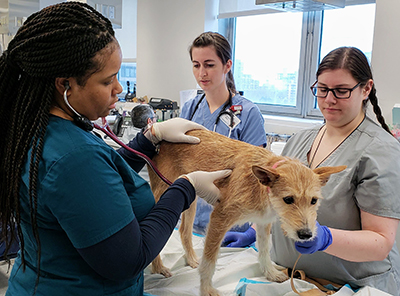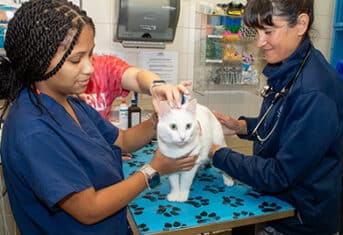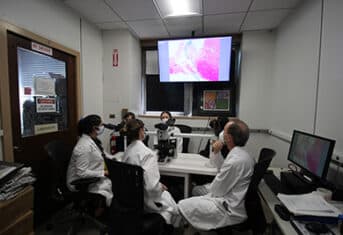Strange Cancers from the Animal World

Strange Cancers from the Animal World
Being a veterinary oncologist by training, an article about cancer always catches my attention. I wanted to share some strange cancer news from the animal world for this week’s blog post.
Contagious Cancer in Dogs
I have a very special patient right now, Melinda, a recipient of a grant from AMC to the Rescue, the Animal Medical Center’s fund to support specialty care for animals in need of a forever home. Melinda has a strange cancer called transmissible venereal tumor. This tumor is contagious and typically spreads between dogs during mating. Even though this tumor can look ugly, it is usually curable with several rounds of chemotherapy, and Melinda is responding well to treatment. Analysis of the cells in transmissible venereal tumor finds fewer chromosomes than in normal dog cells. The chromosomes in the tumor are shaped differently than normal dog chromosomes. Transmissible venereal tumor was first reported in 1876, but genetic analysis tells us the tumor is thousands of years old.
Cancer Immunotherapy for Tasmanian Devils
Beginning in the 1990’s, wildlife biologists identified a new type of cancer in Tasmanian devils. Like the transmissible venereal tumor of the dog, the devil facial tumor has chromosomal abnormalities and is spread when a male devils fight over a potential mate. The tumors are fatal and in certain areas of Tasmania, nearly 90% of devils were lost to this disease. But in March 2018, an encouraging report was published in Nature. Scientists at the University of Tasmania created an antitumor vaccine from devil facial tumor cells which were modified to make them induce an immune response against a tumor already present on the face of a Tasmanian devil. In three of five devils treated with the vaccine, the tumors regressed. This is the first step to helping eradicate this tumor from wild devils and also saving this rare and endangered species.
No Cancer in Elephants
Studying cancer in animals helps researchers understand cancer in humans. For example, bone cancer or osteosarcoma occurs more commonly in dogs than in children and for years, the dog has served as a model for developing new osteosarcoma treatments. Elephants are a species less likely to get cancer than other animals, like humans and dogs. By studying the DNA of elephants, scientists have found clues to why these majestic creatures are resistant to cancer. One reason is elephants have multiple copies of a gene TF53. The gene codes for a protein p53 which helps to remove mutant cells before they become cancerous.
In a second study, scientists found elephant’s cells repair damage quickly and that keep cells from going rogue and becoming malignant. Understanding the unique resistance of elephants to cancer may lead to methods of cancer prevention in creatures more susceptible to cancer.
Cancer is a frightening and devastating disease in everyone, including pets, wildlife and humans. But by studying the biology of cancer in multiple species, we can make progress in understanding and treating this dreaded disease.































